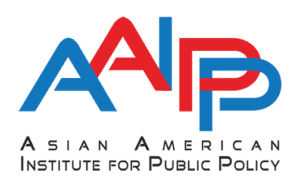Asian American
Institute for
Public Policy
A nonprofit public policy organization
dedicated to advancing equality and
full participation for Asian Americans
Election 2024
2024 Post-Election Survey: AAPI Voters Shifted Rightward in their presidential vote choice and Have Mixed Views on Policy of Mass Deportation of Undocumented Immigrants
Immigration
What are Americans’ views of deportations?
According to the Pew Research Center survey conducted February 24 – March 2, almost one-third (32%) of U.S. adults support deportation of all immigrants living in the U.S. illegally. By race and ethnicity, White adults (39%) are more likely than Asian (22%), Black (19%) or Hispanic (16%) adults to say all immigrants in the country illegally should be deported.
About half (51%) of U.S. adults indicate that at least some should face deportation.
The Trump Presidency
New AAIPP survey finds that a majority of AAPI voters are dissatisfied with Donald Trump’s presidency in the first 100 days of his second term. AAPI voters generally disapprove of President Trump’s handling of the economy, inflation, tariffs & trade, as well as deportations of legal and undocumented immigrants.
AAIPP Bulletin
Published eleven times a year, this data - driven newsletter covers the latest of certain pressing national policy issues and their implications to Asian Americans.
AAPI adults are concerned about changes to college landscape and intergenerational progress
AP-NORC/AAPI Data Poll (May 21, 2025)
What Happened in 2024
Catalist (May 19, 2025)
The Emerging Financial Security Crisis Facing Older Adults Across New York State
Center for an Urban Future (February 2025)
Tariffs could deal a blow to Chinatowns that have no choice but to import cultural goods, locals say
NBC News (March 9, 2025)
Racial Attitudes Among Asian American Parents and Their Influence on School Choice
Tiffany Wu, Adriana Villavicencio, Verenisse Ponce Soria
Harvard Educational Review (December 10, 2024)
Most AAPI Adults Think K-12 Students Should Learn About Slavery, Racism, Segregation, and the History of AAPI Communities
AAPI Data / AP-NORC survey (May 29, 2024)
The Fertility of Immigrants and Natives in the United States, 2023
Center for Immigration Studies (May 1, 2025)
Disaggregated colorectal cancer mortality among Asian American subgroups between 2005-2020
AACR Journals (April 21, 2025)
Strangers in the Land: Exclusion, Belonging, and the Epic Story of The Chinese in America
Michael Luo
Penguin Random House (April 29, 2025)
Southeast Asians in L.A. region are being detained, deported at routine ICE check-ins
The Los Angeles Times (April 22, 2025)
Trump’s Job Rating Drops, Key Policies Draw Majority Disapproval as He Nears 100 Days
Pew Research Center (April 23, 2025)
Empowered/Imperiled: The Rise of South Asian Representation and Anti-South Asian Racism
Stop Anti-Asian Hate (October 9, 2024)
Negative Views of China Have Softened Slightly Among Americans
Pew Research Center (April 17, 2025)
Americans Remain Critical of China
Pew Research Center (May 1, 2024)
Most Asian Americans View Their Ancestral Homelands Favorably, Except Chinese Americans
Pew Research Center (July 19, 2023)
Americans’ Trust in One Another
Pew Research Center (May 8, 2025)
Five Years of the STAATUS Index 2025
The Asian American Foundation (May 1, 2025)
A Snapshot of Asian Wealth in America
Urban Institute (May 1, 2025)
Breakthrough ROI: Investing in Asian American Audiences and Media
Nielsen (April 23, 2025)
Acknowledgement
AAIPP’s work has been generously supported by the C.J. Huang Foundation and individual donors.
Ways to Give
AAIPP welcomes general-purpose contributions as well as designated gifts for specific purposes such as a research project, a policy/research fellowship, the monthly AAIPP Bulletin, etc. All contributions are tax deductible. For further details, please contact Cao O at cao@aaipp.org
About Us
Amplify Asian American Voice & Thought Leadership
The Asian American Institute for Public Policy (AAIPP) is a nonprofit public policy organization dedicated to advancing equality and full participation for Asian Americans. It works to amplify Asian American voice and thought leadership to address community concerns and to contribute pragmatic solutions to vital social, economic, and political issues in America. Through an inclusive perspective and a balanced approach, AAIPP seeks to promote reasoned dialogue and informed policy discourse that is guided by data, empirical research and critical analysis.













